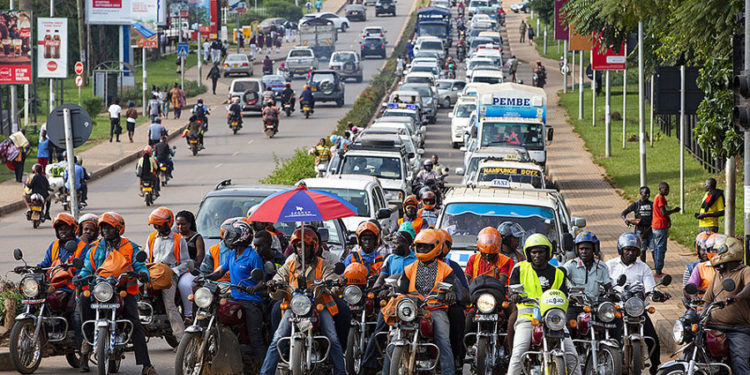Amidst the chaotic symphony of honking horns and bustling streets with pothole roads, Bodaboda riders in Kampala, the heartbeat of Uganda’s capital, face many hardships that paint a poignant picture of their daily struggles, extending beyond mere transportation.
Bodaboda riders weave through traffic, offering a vital means of transportation for thousands of commuters daily. However, beneath the surface of this essential service lie a multitude of challenges and hardships that these riders confront on a daily basis.
Originating from the border town of Busia, these motorcycle taxis have evolved into a ubiquitous mode of transport across the country. The name “bodaboda” is said to have originated from the early days when people crossed the border between Kenya and Uganda; the phrase “border-to-border” was shortened to “boda-boda.”
Their originality lies in their adaptability and versatility. Initially used for quick border crossings, bodabodas quickly became a popular means of transport due to their ability to navigate through traffic-congested urban areas and reach remote rural locations where larger vehicles couldn’t go. They offer flexibility, affordability, and accessibility, making them a preferred choice for many Ugandans.
They have also become a symbol of entrepreneurship in Uganda. Many individuals, especially young people, have capitalized on this mode of transport to create employment opportunities for themselves by becoming bodaboda riders. This entrepreneurial spirit has led to the establishment of bodaboda stages or stops where riders wait for passengers, creating a network of informal transportation hubs across cities and towns.
Despite their popularity, Bodabodas in Kampala have encountered significant challenges, especially concerning safety. Accidents and incidents involving reckless riding have raised concerns about the risks associated with using these motorcycle taxis. Moreover, in the capital city of Kampala, the risks are amplified by encounters with law enforcement, often posing an additional challenge for Bodaboda riders. Instances where law enforcement personnel contribute to the challenges faced by these motorcycle commuters have become a notable concern in ensuring the safety and fair treatment of riders.
The perilous roads and safety concerns are one of the major challenges they face. The congested and often chaotic roads of Kampala currently full of potholes pose significant risks to Bodaboda riders. Maneuvering through traffic jams and navigating around vehicles and pedestrians these riders face constant danger. The lack of adherence to traffic regulations by both riders and other road users further compounds the risks, leading to a high rate of accidents and injuries among Bodaboda operators.
The absence of proper safety gear for many riders exacerbates this issue, leaving them vulnerable to serious injuries in the event of accidents. Moreover, the absence of adequate medical insurance or support mechanisms amplifies the financial strain caused by such incidents.
The government through authorities such as the Kampala Capital City Authority, Police, Ministry of Transport and Works, and other regulatory bodies, established stringent traffic regulations governing the operations of vehicles and motorcycles, including boda bodas, covering crucial aspects such as the allowable number of passengers, the requirement for third-party insurance, adherence to driving on the right side of the road, mandatory helmet usage, and the necessity of reflector jackets. However, boda boda accidents have emerged as a significant threat on Ugandan roads despite these measures.
Also, obtaining licenses and insurance remains a significant hurdle for many Bodaboda riders and has also been highlighted in many reports. The complexities involved in the licensing process, coupled with high associated costs, often result in riders operating without proper documentation. This leaves them susceptible to legal repercussions and financial instability, especially when faced with accidents or confrontations with law enforcement.
“Additionally, the economic hardships faced by these riders cannot be understated. According to reports from the Economic Policy Research Center, the earnings from ferrying passengers across the city are often marginal, barely enough to cover expenses such as fuel, motorcycle maintenance, and daily sustenance. Fluctuating fuel prices and rising maintenance costs further strain their already tight budgets, making it challenging to break out of this cycle of financial uncertainty.
Unnecessary arrests by the police have subjected numerous bodaboda riders in Kampala to the venom of police brutality, particularly during their arrests. In a recent interview conducted at the bustling Bodaboda stages in the city centre, Andrew Kasoma, a seasoned rider, shed light on the distressing reality faced by riders.
He revealed that during various police operations targeting bodabodas, the officers in charge often demand arbitrary payments. These demands, supposedly for violations or fines, frequently end up in the officers’ pockets rather than being officially processed.
Kasoma emphasized the frustration among riders, highlighting instances where these operations turn into extortion schemes rather than lawful enforcement.
“You see, they’ve been conducting operations on bodabodas since Monday. Do you know why? These officers are now hunting for extra money for Christmas. If they flag your motorcycle for impoundment, they’ll demand over Shs60,000. But if you negotiate, they typically settle for Shs30,000 to Shs45,000. Dealing with retrieving your motorcycle at CPS is exhausting, so often, we end up paying them off just to let us go. Sometimes, if luck isn’t on your side, you could end up spending over Shs100,000 on these operations because these traffic officers are dishonest. Right now, I’d rather deal with going to CPS than giving in to these corrupt officers,” he expressed frustratedly.
Meanwhile, the trials faced by Bodaboda riders in Kampala are not merely isolated struggles but emblematic of a larger narrative concerning urban mobility, safety, and socio-economic disparities. As these riders navigate the city’s bustling arteries, their challenges underscore the need for collaborative efforts to effect substantial change.
Addressing the perils on the roads demands a collective commitment to enforcing traffic regulations and fostering a culture of road safety. Simultaneously, streamlining the bureaucratic processes for licensing and insurance is essential to safeguard the livelihoods of Bodaboda operators from corrupt officers.
Do you have a story in your community or an opinion to share with us: Email us at editorial@watchdoguganda.com













